The birds, squirrels and the monkeys that greet me every morning have deserted me and I sit a tad forlornly watching the rain pelting down. Hmm, the grass will need cutting soon, but the more urgent need is company with the morning cuppa.The one I select is past its prime. A bit battered and worn out the outer skin crumbles at my touch. I remove the dust cover gingerly, savouring the touch of the deep red hard cover. The gold embossed letters glistens, beckoning me inside.
Chairman Mao springs to life in a cool portrait photograph, giving a sideways glance as if he is acknowledging his readers. Here is the legend, the rational politician and the romantic poet, a good choice to breakfast with.
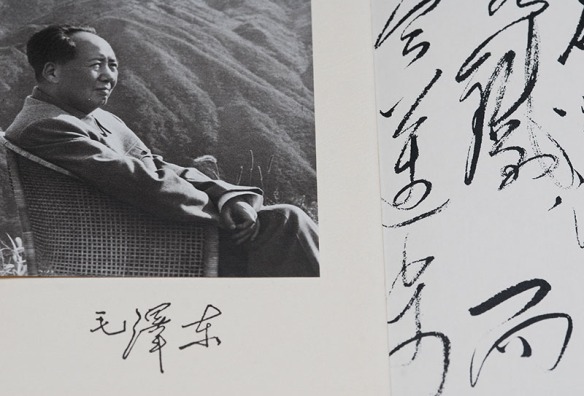
Inside photograph covered with a transparent tissue paper of Mao Tsetung and a part of his handwritten poem “Laushan Pass.” Photo copyright Chulie de Silva.
The photo is not a printed page but is an actual black and white photo affixed to the page with a printed signature below it. I nearly miss the next page – a thrice folded paper. Open it out, and it is a facsimile of the poem Loushan Pass in the poet’s handwriting.The book was printed by the Foreign Language Press, Peking in 1976, the same year Chairman Moa died and is minimalistic in design. Each poem’s headline is in red and the collection has 36 poems and a couple of author’s notes. Translators are not credited but there is a note on the verse form at the end of the book.
Loushan Pass was written in February, 1935, during the Long March. The Pass is a gorge among mountains in Guizhou province, China. Mao wrote this poem after the Red Army defeated the local government army after a fierce battle and occupation of the pass.
Loushan Pass
— to the tune of Yi Chin O
Fierce the west wind,
Wild geese cry under the frosty morning moon.
Under the frosty morning moon
Horses’ hooves clattering,
Bugles sobbing low.
Idle boast the strong pass is a wall of iron,
With firm strides we are crossing its summit.
We are crossing its summit,
The rolling hills sea-blue,
The dying sun blood-red.
Wikipedia’s article author doesn’t think that Mao was one of the best Chinese poets. However, says that like most Chinese intellectuals of his generation, Mao received rigorous education in Chinese classical literature, and therefore his skill in poetry is of little surprise. “His style was deeply influenced by the “Three Lis” of the Tang Dynasty: poets Li Bai, Li Shangyin, and Li He. He is considered to be a romantic poet, in contrast to the realist poets represented by Du Fu .”
The book opens with Changsha written in 1925 and continues in chronological order to ones written during the Red Army’s epic retreat during the Long March of 1934-1936. Mao continues his poetry writing after coming to power in 1949. The Note on the verse form at the end says “Those which carry the subtitle to the tune of … belong to the type of verse called tzu. The rest are either lu or chueh, two varieties of the type shih.
Unlike my first reading, this time I search for more info and discovered that Orange Island mentioned in Changsha, is an island in the middle of Hsiang River (also referred as Xiang River) near Changsha, the capital of Hunan province. Mao attended the Hunan First Normal University around 1912-1917 and it was at Orange Island that Mao met many of his friends and discussed the way to change the world. A huge statue of Chairman Mao now dominates the landscape of this island.
I can’t help but reflect that with a few words changed Chansha could fit the JVP insurrection of 1971.
Changsha (1925)
Alone I stand in the autumn cold
On the tip of Orange Island,
The Hsiang flowing northward;
I see a thousand hills crimsoned through
By their serried woods deep-dyed,
And a hundred barges vying
Over crystal blue waters.
Eagles cleave the air,
Fish glide under the shallow water;
Under freezing skies a million creatures contend in freedom.
Brooding over this immensity,
I ask, on this boundless land
Who rules over man’s destiny?
I was here with a throng of companions,
Vivid yet those crowded months and years.
Young we were, schoolmates,
At life’s full flowering;
Filled with student enthusiasm
Boldly we cast all restraints aside.
Pointing to our mountains and rivers,
Setting people afire with our words,
We counted the mighty no more than muck.
Remember still
How, venturing midstream, we struck the waters
And the waves stayed the speeding boats?
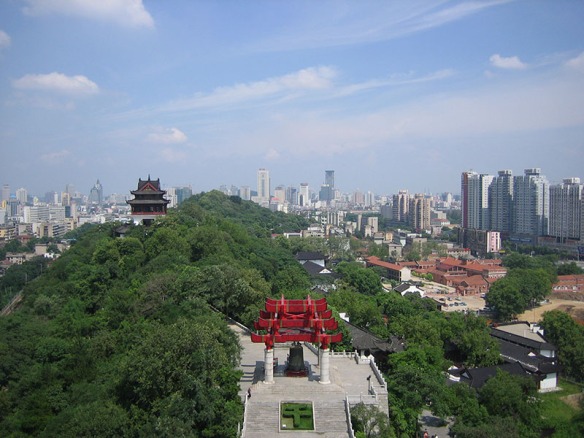
View to the east from the Yellow Crane Tower. The eastern part of the Snake Hill is in the middle; the red-brick compound of the Wuchang Uprising memorial is to the right of it. Reproduced under the Creative Commons Attribution.
Yellow Crane Tower, a building on the bank of Yangtze River in Wuhan, is very famous in Chinese history and literary tradition, says Wikipedia. It is one of the Four Great Towers in China. Its fame mainly comes from a poem written by Cui Hao in early Tang Dynasty, part of which is :
The yellow crane has long since gone away,
All that here remains is Yellow Crane Tower.
The yellow crane once gone does not return,
White clouds drift slowly for a thousand years.
Mao later discussed the historical context of his poem’s writing: “At that time (1927), the Great Revolution failed, I was very depressed and didn’t know what to do, so I wrote this poem”.
The searches on the Net, brings an amazing array of photos that bring alive Mao’s poetry. Interesting sentiments are expressed in his poem Kunlun which refers to the Kunlun Mountains.

Photo of Kunlun Mountains reproduced here under the Creative Commons Attribution-Share Alike 3.0 Unported license.
KUNLUN
— to the tune of Nien Nu Chaio
October 1935
Far above the earth, into the blue sky,
You, wild Kunlun, have seen
All that was fairest in the world of men.
Your three million white jade dragons in flight*
Freeze the sky with piercing cold.
In summer days your melting torrents
Flood the streams and rivers,
Turning men into fish and turtles.
Who has passed judgement on the good and ill
You have wrought these thousand autumns?
In Kunlun now I say,
Neither all your height
Nor all your snow is needed.
Could I but draw my sword o’ertopping heaven,
I’d cleave you in three:
One piece for Europe,
One for America,
One to keep in the East.
Peace would then reign over the world,
The same warmth and cold throughout the globe.
At last in Kunlun I meet the jade dragons of mythical fame. In the author’s note to the poem in the book he says ‘While the three million dragons of white jade dragons were fighting, the air was filled with their tattered scales flying.” Thus he described the flying snow. I have borrowed the image to describe the snow capped mountain. In summer, when one climbs to the top of Minshan, one looks out on a host of mountains, all white, undulating as in a dance. Among the local people a legend was current to the effect that all these mountains were afire until the Monkey King borrowed a palm leaf fan and quenched the flames, so this mountain turned white.”
So in the book I roam beside Mao, among the snow laden mountains and plum blossoms, rolling hills, deep gorges and blue seas to rejoice at the victory of the People’s Liberation Army capturing Nanking.
Amidst all this in the book, my attention is caught by a poem written as an inscription on a photograph and reveals why he admires the Chinese lasses.
The book was a copy I had pilfered away, from my father’s damp salt laden bookrack during the monsoon, a couple of weeks before he left us. I can only imagine now, how much joy my poetry imbibing father would have got from this book.
As always there’s another hidden story embedded in this book. As I remove the dust cover and look at the writing on the top left-hand corner, my thoughts drifts to a comment made by my younger son when I was gifting him a book.“Why do you need to write in the book it is from you. I know you gave it to me and you know you gave it to me -writing in a book is such an ego thing!.” I didn’t disagree with him then. But, now I realise how a few words written inside a white ant eaten book cover can flood your memories of a very long and loving friendship.

Few words penned on the inside cover by my parent’s friend Wimalatissa Indrasoma. Photo copyright Chulie de Silva.
The book was a gift to my father Bennie and my mother Manel by one of my father’s childhood friends Wimalatissa Indrasoma, fondly called Wimalaya by my parents. A gentle giant of a man, himself an author with a wonderful sense of humour. On the 27 August 1980, he would have been knocking on the long french doors of our house in Hikkaduwa, calling “Beniyo, Beniyo,” and my father would have come out as often he did, re-tying the knot on his sarong and smoothing his ruffled hair to greet him. My mother would have come out too, leaving her chores in the kitchen. There would have been laughter exchange of jokes, and an invitation to stay for lunch. … The past does come tumbling out, the clock gets put back, in expressive poetry, or even in a few words written with love.

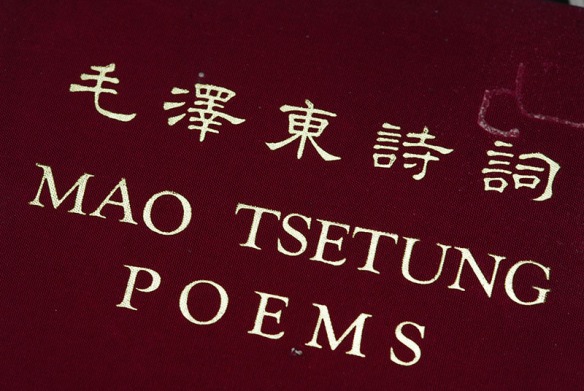
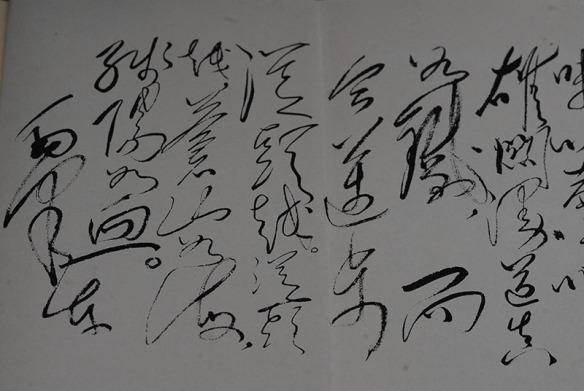

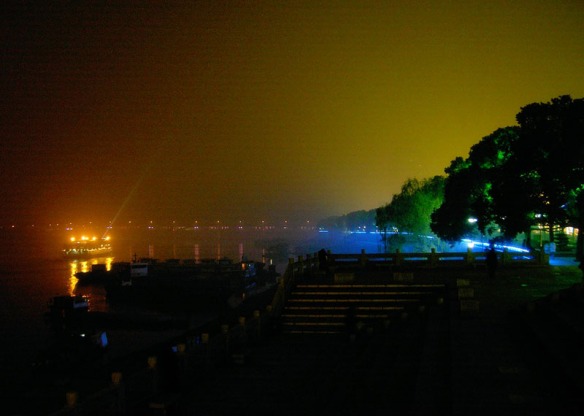



Chulie long time since I’ve read your blog … life’s torrent sweeping me past good things carelessly. It’s good to return. I especially like your ending to this; I love the way you bring it back to family and your endlessly rich stream of personal history. How’s your very own “Running in the Family” coming along? I’m greedy for my copy.
Thanks Dale for taking the time to read and comment — the steady stream (not a torrent) of consultancy work has to end for me to get on with my book. I promise to move it to priority no.1 by beginning of next year. I write these pieces in between to keep the hunger pangs going….
not just an elegy to a sweet book but to signature and time and a father and old friends… …esp. since here was the quintessential poet not just steeled with pen…whose living poetry was about transforming an Asian country from induced impoverishment (yet having wiki decide who a chinese poet or not is a bit sad 🙂